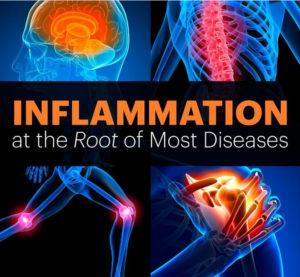CHRONIC INFLAMMATION AND MENTAL HEALTH
 Surprising as it may seem, inflammation plays a role in anxiety, depression, OCD, and most other health disorders. Inflammation is the new buzzword in medicine yet it seems to be a vague and unclear subject to understand. This article is a concise explanation of the process we call inflammation, in everyday language without the technical jargon.
Surprising as it may seem, inflammation plays a role in anxiety, depression, OCD, and most other health disorders. Inflammation is the new buzzword in medicine yet it seems to be a vague and unclear subject to understand. This article is a concise explanation of the process we call inflammation, in everyday language without the technical jargon.
Every one of us has seen our fair share of ads for nutritional supplements and articles about the deleterious effects of inflammation; yet inflammation is an essential part of the healing process. We’re all familiar with the traditional symptoms such as redness, swelling, tenderness, and fever; but inflammation goes much further than these symptoms.
Acute inflammation serves a purpose and is an important part of our immune system’s response to an injury or an infection. Once the injury or infection is healed, the inflammation is supposed to stop. When the inflammation persists it becomes chronic and a serious health issue. Inflammation is a far reaching and very complicated subject since it interacts with many cellular processes and goes well beyond the classic symptoms we’re all familiar with.
When inflammation continues after it has out-lived its purpose, we refer to it as chronic inflammation. Left untreated, chronic inflammation can damage or kill healthy cells, tissues, organs, and damage to the DNA in healthy cells. This in turn causes and/or contributes to many, diseases such as inflammatory bowel diseases, Alzheimer’s and other types of dementia; cancer, heart disease, autoimmune diseases, mental illness, and countless others. Scientists have documented inflammation for centuries, but only within the past few decades have we begun to understand the processes and effects of chronic inflammation; especially on mental health.
INFLAMMATION IS A PROCESS
When the body incurs an injury or infection the liver secretes certain proteins into the blood stream which are then utilized by the immune system in the gut. Special blood cells are also created rush to the injury or infected area and clean up the damaged or dead cells by emitting inflammatory mediators when a virus, bacteria, or other harmful foreign bodies enter the bloodstream. This process is natural if and good only temporary or acute; and dangerous when it becomes chronic. When the inflammatory mediators remain in the bloodstream too long, they begin to damage and kill healthy cells, organs, and damage the DNA. A paradigm example of this would be an autoimmune disorder such as Multiple Sclerosis; which causes the immune system to turn on itself and kill good cells, tissues, and organs.
INFLAMMATION IN THE BRAIN
When these inflammatory mediators make their way through the peripheral, enteric, and arrive in the central nervous systems; they can cross the blood-brain-barrier and assimilate into the brain cells and cause damage. Here in the brain they can destroy or damage the neurotransmitters and other cellular functions; and either trigger or cause depression, anxiety, OCD, and other mental illnesses. Research suggests that when someone with depression has uncontrolled inflammatory mediators in their system, it is tougher to treat the depression. These inflammatory mediators are also found in fat cells, which is why obesity is a health risk.
In some depressed and anxious patients, chronic inflammation can be either the cause or a strong contributing factor. Many studies show a strong correlation between increased levels of inflammatory mediators among those suffering from depression, anxiety, OCD, and PTSD. These mediators can be measured and used as bio-markers. Some scientists are even experimenting with transferring the bacteria from the gut of a healthy sibling to the gut of a sibling with depression in hopes of finding a treatment.
INFLAMMATION LINKED TO DEPRESSION AND ANXIETY
Individuals with depression and anxiety might receive some benefits from anti-inflammatory medications, such as aspirin and ibuprofen. Some research suggests that SSRI and SNRI antidepressants may be effective because of their anti-inflammatory properties more than their inhibition of neurotransmitter reuptake. This study should be considered anecdotal for now. Aspirin doesn’t treat depression; yet it was worth noting. Lifestyle issues such as exposure to toxins, high body-mass-index, too much alcohol, smoking, too little or too much exercise, and chronic stress all contribute to chronic inflammation. Managing inflammation by a healthy diet with green vegetables, exercise, proper sleep, vitamin D, probiotics, spices with anti-inflammatory properties, such as turmeric, ginger or garlic; will greatly help to reduce the effects. Getting control of all forms of inflammation that affect your body should be the primary goal of your exercise and diet.
Science has only scratched the surface of understanding the role of inflammation as it pertains to our overall health. It is a settled fact that the immune system has an inextricable relationship with neurological changes in our brains as well as other systems in the body. Many of the current findings are enlightening, yet this is a complex field of investigation as inflammation is interconnected with many other processes and issues. Scientists tell us that unknown inflammation is the new silent killer. Finding biomarkers to target and treat inflammation is a high priority. One thing that is sure is that inflammation along with genetic engineering are clearly the direction of medicine and mental health in the future. Read more on inflammation and anxiety.
